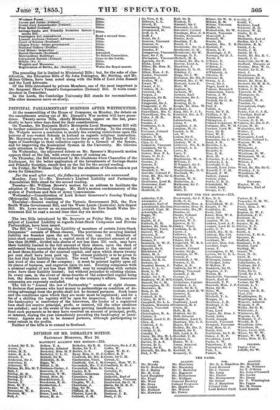PRINCIPAL PARLIAMENTARY BUSINESS AFTER WHITSUNTIDE.
At the reassembling of the House of Commons, on Monday, the debate on the amendments arising out of Mr. Disraeli's War motion will have prece- dence. Twenty-seven Bills, chiefly Ministerial, appear on the list, prac- tically to have other days fixed for their consideration. On Tuesday, Sir Benjamin Hall's Metropolis Local Management Bill will be further considered in Committee, at a forenoon sitting. In the evening, Mr. Walpole moves a resolution to modify the existing restrictions upon the patrons of non-vested Schools in Ireland as regards religious inatruction. Mr. Heywood moves for a Bill to transfer the powers of the Heads of Col- leges at Cambridge in their collective capacity to a Council of. the Senate, and for improving the Academical System in the University. Mr. Oliveira rails attention to the Wine-duties.
On Wednesday, the adjourned debate on Mr. Spooner's Maynooth motion appears third on the list, with every chance of coming on. On Thursday, the Bill introduced by Mr. Gladstone when Chancellor of the Exchequer, for the better application of the Investments of Savings-Banks and Friendly Societies, stands first on the list for the second reading. On Friday, Sir William Clay's Bill for the abolition of Church-rates is put down for Committee.
For the week after next, the following arrangements are announced. Monday, June 11—Mr. Bauverie's Limited Liability and Partnership Amendment Bills stand for the second reading.
Tuesday—Mr. William Brown's motion for an address to facilitate the adoption of the Decimal Coinage. Mr. Rich's motion condemnatory of the system of Purchase and Sale of Army Commissions. Wednesday—Consideration of Lord Robert Grosvenor's Sunday Trading (Metropolis) Bill, in Committee. Thursday—Second reading of the Victoria Government Bill, the New South Wales Government Bill, and the Waste Lands (Australia) Acts Repeal Bill. Mr. Lowe moves as an amendment, that the New South Wales Go- vernment Bill be read a second time that day six months.
The two Bills introduced by Mr. Bouverie on Friday May 25th, on the subject of Limited Liability as regards Joint-Stock Companies and Private Partnerships, have been issued.
The Bill for "Limiting the Liability of members of certain Joint-Stock Companies"' consists of fifteen clauses. The provisions for securing limited liability are founded upon the act Victoria viii. cap. 110. Members of joint-stock companies having a capital stock of the nominal amount of not less than 20,0001., divided into shares of not leas than 25/. each, may have their liability limited to the full amount of their shares, upon the deed of settlement being executed by shareholders holding shares to the amount of at least three-fourths of the nominal capital, and upon which shares twenty per cent shall have been paid up. The utmost publicity is to be given to the fact that the liability is limited. The word " limited " must form the last word of the name of the company ; it must be painted legibly upon all its places of business, and engraven upon its seal. Existing companies with a nominal capital of not less than 20,0001. may by complying with certain rules have their liability limited; but without prejudice to existing claims. In every case, in the event of three-fourths of the subscribed capital being lost, the directors are bound to wind up the company's affairs. Insurance companies are expressly excluded. The bill to "Amend the law of Partnership" consists of eight clauses. It declares that persons who lend money to partnerships on condition of de- riving advantage from the profits shall not be deemed partners. Such loans -and the conditions upon which they are made must be registered; and for a fee of a shilling the registry will be open for inspection. In the event of the bankruptcy or insolvency of the borrowers, the lender of a registered loan shall not receive principal, profit, or interest, till the other creditors are satisfied ; and in the event of the assets proving insufficient, he must re- fund such payments as he may have received on account of principal, profit, or interest, during the year immediately preceding the bankruptcy. or insol- vency. Agents are not to be deemed partners, although participating to some extent in the profits.
Neither of the bills is to extend to Scotland.


























 Previous page
Previous page